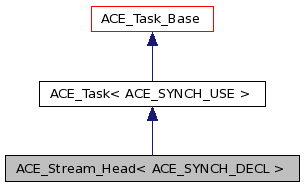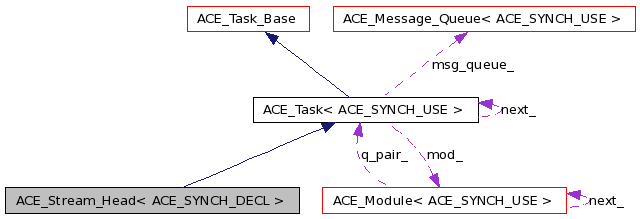Standard task that acts as reader or writer at the head of an ACE_Stream. More...
#include <Stream_Modules.h>


Public Member Functions | |
| ACE_Stream_Head (void) | |
| Construction. | |
| ~ACE_Stream_Head (void) | |
| Destruction. | |
| virtual int | open (void *a=0) |
| virtual int | close (u_long flags=0) |
| virtual int | put (ACE_Message_Block *msg, ACE_Time_Value *=0) |
| virtual int | svc (void) |
| Run by a daemon thread to handle deferred processing. | |
| virtual int | init (int argc, ACE_TCHAR *argv[]) |
| Initializes object when dynamic linking occurs. | |
| virtual int | info (ACE_TCHAR **info_string, size_t length) const |
| Returns information on a service object. | |
| virtual int | fini (void) |
| Terminates object when dynamic unlinking occurs. | |
| void | dump (void) const |
| Dump the state of an object. | |
Public Attributes | |
| ACE_ALLOC_HOOK_DECLARE | |
| Declare the dynamic allocation hooks. | |
Private Member Functions | |
| int | control (ACE_Message_Block *) |
| Performs canonical flushing at the ACE_Stream Head. | |
| int | canonical_flush (ACE_Message_Block *) |
Standard task that acts as reader or writer at the head of an ACE_Stream.
A ACE_Message_Block sent to this task (via its put() hook) triggers actions depending on the block type and whether the task is acting as a reader or a writer. If the block is of type ACE_Message_Block::MB_IOCTL, the block's is assumed to contain (beginning at its rd_ptr()) an ACE_IO_Cntl_Msg object and is processed accordingly. This is usually used to set the task's message queue high water and/or low water marks.
When the block is not ACE_Message_Block::MB_IOCTL, processing depends on the ACE_Stream_Head's role in the module:
Definition at line 51 of file Stream_Modules.h.
| ACE_Stream_Head< ACE_SYNCH_DECL >::ACE_Stream_Head | ( | void | ) |
Construction.
Definition at line 19 of file Stream_Modules.cpp.
{
ACE_TRACE ("ACE_Stream_Head<ACE_SYNCH_USE>::ACE_Stream_Head");
}
| ACE_Stream_Head< ACE_SYNCH_DECL >::~ACE_Stream_Head | ( | void | ) |
Destruction.
Definition at line 25 of file Stream_Modules.cpp.
{
ACE_TRACE ("ACE_Stream_Head<ACE_SYNCH_USE>::~ACE_Stream_Head");
}
| int ACE_Stream_Head< ACE_SYNCH_DECL >::canonical_flush | ( | ACE_Message_Block * | mb | ) | [private] |
Definition at line 84 of file Stream_Modules.cpp.
{
ACE_TRACE ("ACE_Stream_Head<ACE_SYNCH_USE>::canonical_flush");
char *cp = mb->rd_ptr ();
if (ACE_BIT_ENABLED (*cp, ACE_Task_Flags::ACE_FLUSHR))
{
this->flush (ACE_Task_Flags::ACE_FLUSHALL);
ACE_CLR_BITS (*cp, ACE_Task_Flags::ACE_FLUSHR);
}
if (ACE_BIT_ENABLED (*cp, ACE_Task_Flags::ACE_FLUSHW))
return this->reply (mb);
else
mb->release ();
return 0;
}
| int ACE_Stream_Head< ACE_SYNCH_DECL >::close | ( | u_long | flags = 0 |
) | [virtual] |
Hook called from ACE_Thread_Exit when during thread exit and from the default implementation of module_closed(). In general, this method shouldn't be called directly by an application, particularly if the Task is running as an Active Object. Instead, a special message should be passed into the Task via the put() method defined below, and the svc() method should interpret this as a flag to shut down the Task.
Reimplemented from ACE_Task_Base.
Definition at line 48 of file Stream_Modules.cpp.
{
ACE_TRACE ("ACE_Stream_Head<ACE_SYNCH_USE>::close");
return 0;
}
| int ACE_Stream_Head< ACE_SYNCH_DECL >::control | ( | ACE_Message_Block * | mb | ) | [private] |
Performs canonical flushing at the ACE_Stream Head.
Definition at line 62 of file Stream_Modules.cpp.
{
ACE_TRACE ("ACE_Stream_Head<ACE_SYNCH_USE>::control");
ACE_IO_Cntl_Msg *ioc = (ACE_IO_Cntl_Msg *) mb->rd_ptr ();
ACE_IO_Cntl_Msg::ACE_IO_Cntl_Cmds cmd;
switch (cmd = ioc->cmd ())
{
case ACE_IO_Cntl_Msg::SET_LWM:
case ACE_IO_Cntl_Msg::SET_HWM:
this->water_marks (cmd, *(size_t *) mb->cont ()->rd_ptr ());
ioc->rval (0);
break;
default:
return 0;
}
return ioc->rval ();
}
| void ACE_Stream_Head< ACE_SYNCH_DECL >::dump | ( | void | ) | const |
Dump the state of an object.
Reimplemented from ACE_Task< ACE_SYNCH_USE >.
Definition at line 31 of file Stream_Modules.cpp.
{
#if defined (ACE_HAS_DUMP)
ACE_TRACE ("ACE_Stream_Head<ACE_SYNCH_USE>::dump");
#endif /* ACE_HAS_DUMP */
}
| int ACE_Stream_Head< ACE_SYNCH_DECL >::fini | ( | void | ) | [virtual] |
Terminates object when dynamic unlinking occurs.
Reimplemented from ACE_Shared_Object.
Definition at line 150 of file Stream_Modules.cpp.
{
ACE_TRACE ("ACE_Stream_Head<ACE_SYNCH_USE>::fini");
return 0;
}
| int ACE_Stream_Head< ACE_SYNCH_DECL >::info | ( | ACE_TCHAR ** | info_string, | |
| size_t | length | |||
| ) | const [virtual] |
Returns information on a service object.
Reimplemented from ACE_Shared_Object.
Definition at line 137 of file Stream_Modules.cpp.
{
ACE_TRACE ("ACE_Stream_Head<ACE_SYNCH_USE>::info");
const ACE_TCHAR *name = this->name ();
if (*strp == 0 && (*strp = ACE_OS::strdup (name)) == 0)
return -1;
else
ACE_OS::strsncpy (*strp, name, length);
return static_cast<int> (ACE_OS::strlen (name));
}
| int ACE_Stream_Head< ACE_SYNCH_DECL >::init | ( | int | argc, | |
| ACE_TCHAR * | argv[] | |||
| ) | [virtual] |
Initializes object when dynamic linking occurs.
Reimplemented from ACE_Shared_Object.
Definition at line 130 of file Stream_Modules.cpp.
{
ACE_TRACE ("ACE_Stream_Head<ACE_SYNCH_USE>::init");
return 0;
}
| int ACE_Stream_Head< ACE_SYNCH_DECL >::open | ( | void * | args = 0 |
) | [virtual] |
Hook called to initialize a task and prepare it for execution. args can be used to pass arbitrary information into <open>.
Reimplemented from ACE_Task_Base.
Definition at line 41 of file Stream_Modules.cpp.
{
ACE_TRACE ("ACE_Stream_Head<ACE_SYNCH_USE>::open");
return 0;
}
| int ACE_Stream_Head< ACE_SYNCH_DECL >::put | ( | ACE_Message_Block * | , | |
| ACE_Time_Value * | = 0 | |||
| ) | [virtual] |
A hook method that can be used to pass a message to a task, where it can be processed immediately or queued for subsequent processing in the svc() hook method.
Reimplemented from ACE_Task_Base.
Definition at line 103 of file Stream_Modules.cpp.
{
ACE_TRACE ("ACE_Stream_Head<ACE_SYNCH_USE>::put");
int res = 0;
if (mb->msg_type () == ACE_Message_Block::MB_IOCTL
&& (res = this->control (mb)) == -1)
return res;
if (this->is_writer ())
return this->put_next (mb, tv);
else // this->is_reader ()
{
switch (mb->msg_type ())
{
case ACE_Message_Block::MB_FLUSH:
return this->canonical_flush (mb);
default:
break;
}
return this->putq (mb, tv);
}
}
| int ACE_Stream_Head< ACE_SYNCH_DECL >::svc | ( | void | ) | [virtual] |
Run by a daemon thread to handle deferred processing.
Reimplemented from ACE_Task_Base.
Definition at line 55 of file Stream_Modules.cpp.
{
ACE_TRACE ("ACE_Stream_Head<ACE_SYNCH_USE>::svc");
return -1;
}
| ACE_Stream_Head< ACE_SYNCH_DECL >::ACE_ALLOC_HOOK_DECLARE |
Declare the dynamic allocation hooks.
Reimplemented from ACE_Task< ACE_SYNCH_USE >.
Definition at line 75 of file Stream_Modules.h.
 1.7.0
1.7.0